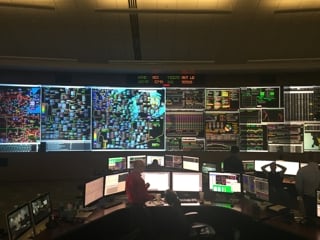Competitive markets ensure prices remain as low as possible under all conditions. Like any other commodity, electricity is bought and sold through wholesale and retail markets. MISO facilitates the buying and selling of wholesale electricity within its region. It is one of the world's largest wholesale electricity markets. Hundreds of companies participate in one or more of MISO's four energy markets to buy and sell billions of dollars worth of electricity each year. The four markets include:
Real-Time Market: The Real-Time Energy Market balances energy supply with demand every five minutes at the least possible cost while maintaining reliable system conditions; including reserve requirements, congestion management and accurate price signals.
Day Ahead Market: The Day-Ahead Market serves as a "planning phase" for the next operating day. This market allows buyers and sellers to lock in pricing prior to real-time. This helps ensure that adequate resources are scheduled to meet the next day's anticipated demand.
Capacity Market: Think of a big shopping mall. On most days, there are more parking spots than cars. However, the parking lot needs to have enough capacity to handle the busiest shopping days each year. Similarly, the capacity market is designed to ensure there is enough electricity supply to meet future demand. The primary purposes include ensuring reliability, attracting investment, encouraging diverse resources, and managing risk by making sure thre is a buffer of capacity available during peak demand and/or unexpected outages.
Financial Transmission Rights (FTR) and Auction Revenue Rights (ARR) Market: When the grid is congested, electricity prices can vary significantly across different locations. FTRs provide a financial mechanism to offset these price differences, enabling participants to manage the risk of fluctuating congestion costs. FTRs promote efficient market operations, encourage investment in transmission infrastructure, enhance maket liquidity, and support the integration of renewable energy resources. Auction Revenue Rights ensure the proceeds from FTR auctions are distributed equitably among the entities entitled to them.

Locational Marginal Pricing (LMP) is a market-based pricing mechanism used in electricity markets to determine the cost of electricity at a specific location on the power grid. It reflects the cost of supplying electricity at a particular point, taking into account the cost of generation, transmission losses, and congestion on the power grid. LMP is used to allocate the costs of electricity generation, transmission and distribution to different locations and to serve as the basis for settling energy transactions. Changing every five minutes or less, LMP reflects changes in supply and demand on the power grid.